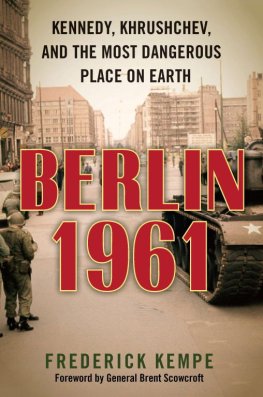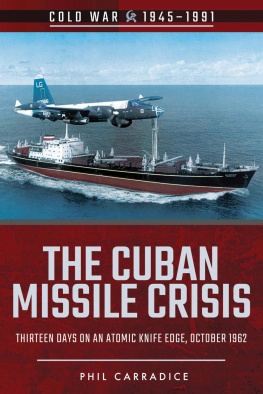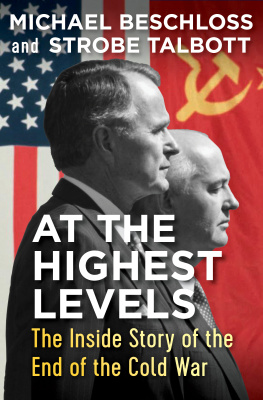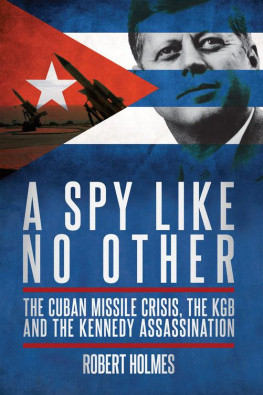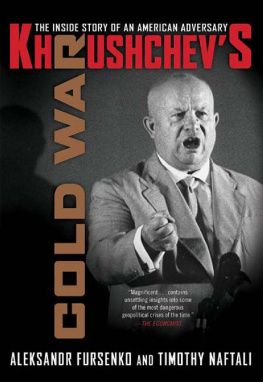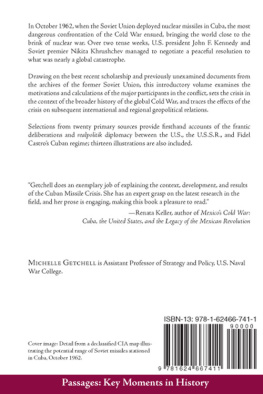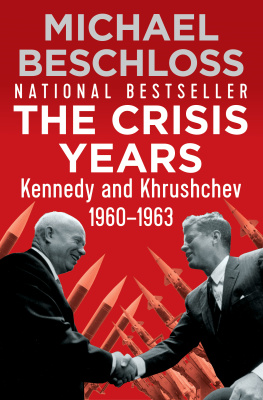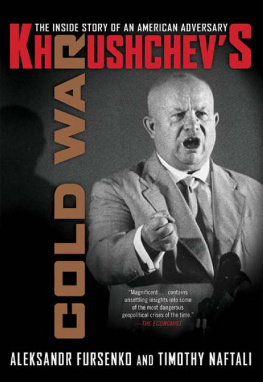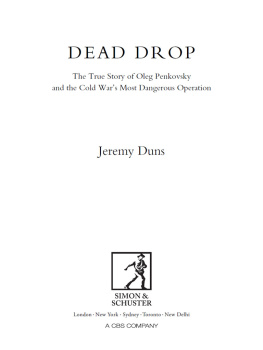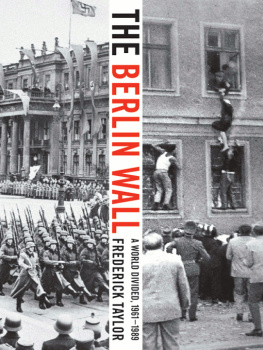EXTRAORDINARY PRAISE FOR FREDERICK KEMPES
BERLIN 1961
As time passes and the political geography of world power mutates, it is easy to forget the most fraught and dangerous crisis of the Cold War, which brought U.S. and Soviet tanks facing each other at close range. Berlin 1961 is a gripping, well-researched, and thought-provoking book with many lessons for today.
Dr. Henry Kissinger
Frederick Kempes compelling narrative, astute analysis, and meticulous research bring fresh insight into a crucial and perilous episode of the Cold War, bringing Kennedy and Khrushchev to life as they square off at the brink of nuclear war. His masterly telling of a scary and cautionary tale from half a century ago has the immediacy of todays headlines.
Strobe Talbott, president, Brookings Institution
History at its best. Kempes book masterfully dissects the Cold Wars strategically most significant EastWest confrontation, and in the process significantly enlightens our understanding of the complexity of the Cold War itself.
Dr. Zbigniew Brzezinski, national security advisor to President Jimmy Carter
What an amazing drama this is! The showdown over Berlin in 1961 was the pivotal episode of the Cold War, far more important and illuminating than the Cuban Missile Crisis. It was a clash between two fascinating leaders, Kennedy and Khrushchev, whose misreading of each other holds lessons for today. Kempes compelling narrative is a triumph of great writing and research.
Walter Isaacson, president and CEO, The Aspen Institute, and author of Einstein: His Life and Universe and Benjamin Franklin: An American Life
An engaging, richly researched, thought-provoking book that captures the drama of, and challenges the conventional wisdom regarding, one of the Cold Wars most decisive years. Frederick Kempe combines the You are there storytelling skills of a journalist, the analytical skills of the political scientist, and the historians use of declassified U.S., Soviet, and German documents to provide unique insight into the forces and individuals behind these events.
General Brent Scowcroft, national security advisor to Presidents Gerald Ford and George H. W. Bush
Fred Kempe has masterfully captured the dramatic dimensions of a great story that shaped the world order for twenty-eight years. Berlin 1961 is an important achievement.
Chuck Hagel, distinguished professor, Georgetown University, and U.S. senator, 19972009
Berlin 1961 takes us to Ground Zero of the Cold War. Reading these pages, you feel as if you are standing at Checkpoint Charlie, amid the brutal tension of a divided Berlin.
David Ignatius, columnist, The Washington Post
InformedHis chronology of memos and meetings dramatizes events behind closed doors. Kempes history reflects balanced discernment about the creation of the Berlin Wall.
Booklist
Kempeskillfully weaves oral histories and newly declassified documents into a sweeping, exhaustive narrative. Likely the best, most richly detailed account of the subject, this will engross serious readers of Cold War history who enjoyed W. R. Smysers Kennedy and the Berlin Wall but appreciate the further detail.
Library Journal
Good journalistic history in the tradition of William L. Shirer and Barbara Tuchman.
Kirkus Reviews
A significant contribution to our understanding of the Cold War. It also will enhance public appreciation of the role of diplomats and diplomacy, because Berlin 1961 is as eminently readable as any good who done it.
American Diplomacy
An engaging study of the 1961 Khrushchev/Kennedy standoff over Berlin, presenting the drama in the journalistic, anecdotal, episode-by-episode modea readable narrative.
The Weekly Standard
BERLIN 1961
KENNEDY, KHRUSHCHEV, AND THE MOST DANGEROUS PLACE ON EARTH
Frederick Kempe

THE BERKLEY PUBLISHING GROUP
Published by the Penguin Group
Penguin Group (USA) Inc.
375 Hudson Street, New York, New York 10014, USA
Penguin Group (Canada), 90 Eglinton Avenue East, Suite 700, Toronto, Ontario M4P 2Y3, Canada (a division of Pearson Penguin Canada Inc.)
Penguin Books Ltd., 80 Strand, London WC2R 0RL, England
Penguin Group Ireland, 25 St. Stephens Green, Dublin 2, Ireland (a division of Penguin Books Ltd.)
Penguin Group (Australia), 250 Camberwell Road, Camberwell, Victoria 3124, Australia (a division of Pearson Australia Group Pty. Ltd.)
Penguin Books India Pvt. Ltd., 11 Community Centre, Panchsheel Park, New Delhi110 017, India
Penguin Group (NZ), 67 Apollo Drive, Rosedale, Auckland 0632, New Zealand (a division of Pearson New Zealand Ltd.)
Penguin Books (South Africa) (Pty.) Ltd., 24 Sturdee Avenue, Rosebank, Johannesburg 2196, South Africa
Penguin Books Ltd., Registered Offices: 80 Strand, London WC2R 0RL, England
Copyright 2011 by Frederick Kempe.
Interior map copyright 2011 by Jeffrey L. Ward.
Front cover photograph copyright by Jung-ullstein bild / The Granger Collection.
All rights reserved.
No part of this book may be reproduced, scanned, or distributed in any printed or electronic form without permission. Please do not participate in or encourage piracy of copyrighted materials in violation of the authors rights. Purchase only authorized editions.
BERKLEY is a registered trademark of Penguin Group (USA) Inc.
The B design is a trademark of Penguin Group (USA) Inc.
The Library of Congress has cataloged the G. P. Putnams Sons hardcover as follows:
Kempe, Frederick.
Berlin 1961: Kennedy, Khrushchev, and the most dangerous place on earth / Frederick Kempe.
p. cm.
Includes bibliographical references and index.
ISBN: 978-1-101-51502-0
1. Kennedy, John F. (John Fitzgerald), 19171963. 2. Berlin (Germany)Politics and government19451990. 3. Berlin Wall, Berlin, Germany, 19611989. 4. United StatesForeign relationsSoviet Union. 5. Soviet UnionForeign relationsUnited States. I. Title.
E841.K34 2011 2010033163
943'.1550875dc22
For Pam
Contents
FOREWORD
by General Brent Scowcroft
H istorians have scrutinized the Cuban Missile Crisis of 1962 far more deeply than they have the Berlin Crisis that preceded it by a year. For all the attention given Cuba, however, what happened in Berlin was even more decisive in shaping the era between the end of World War II in 1945 and German unification and Soviet dissolution in 1990 and 1991. It was the Berlin Walls rise in August 1961 that anchored the Cold War in the mutual hostility that would last for another three decades, locking us into habits, procedures, and suspicions that would fall only with that same wall on November 9, 1989.
Furthermore, there was a special intensity about that first crisis. In the words of William Kaufman, a Kennedy administration strategist who worked both Berlin and Cuba from the Pentagon, Berlin was the worst moment of the Cold War. Although I was deeply involved in the Cuban Missile Crisis, I personally thought that the Berlin confrontation, especially after the wall went up, where you had Soviet and U.S. tanks literally facing one another with guns pointed, was a more dangerous situation. We had very clear indications mid-week of the Cuban Missile Crisis that the Russians were not really going to push us to the edge.
You didnt get that sense in Berlin.
Fred Kempes contribution to our crucial understanding of that time is that he combines the You are there storytelling skills of a journalist, the analytical skills of the political scientist, and the historians use of declassified U.S., Soviet, and German documents to provide unique insight into the forces and individuals behind the construction of the Berlin Wallthe iconic barrier that came to symbolize the Cold Wars divisions.


